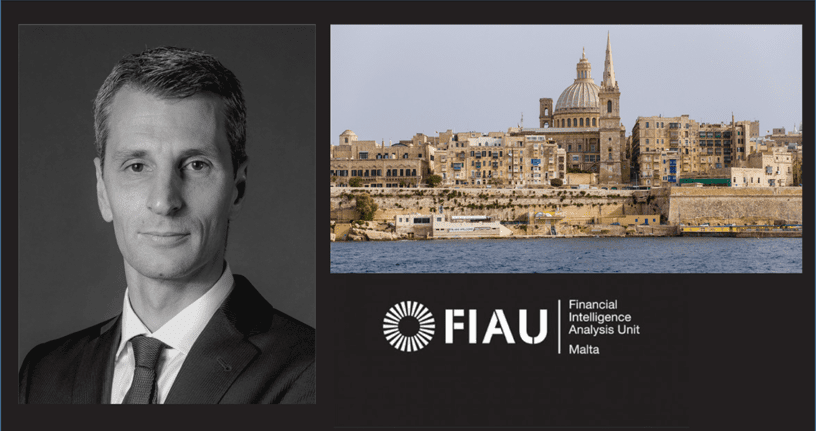By Elizabeth Hearst for AMLi
The small Mediterranean island country of Malta – famed for its warm climate, picturesque cliffs and historical sites has garnered global attention for reported deficiencies in its anti-money laundering regime.
The US Department of State Money Laundering assessment details how the EU Member State’s location between North Africa and Italy has made it a “transit point” for narcotics and human trafficking to Europe. The US has earmarked Malta as a “monitored” jurisdiction and has noted that its gaming industry “may serve as a conduit for money laundering activities”.
The Maltese Financial Intelligence Analysis Unit (FIAU) has recently brought penalties against a number of financial institutions in order to crack down on “dirty money”. In 2020, the FIAU has sanctioned both FIMbank and Sparkasse but many industry professionals believe more needs to be done to tackle financial crime in Malta.
I speak to Alfred Zammit, Deputy Director of the FIAU about the challenges the unit faces having just been downgraded by the OECD to “partially compliant” and criticised for its “lack of supervision”. I ask Zammit about the potential “greylisting” of the country by MONEYVAL, what can be done to prevent this and how the FIAU is sending out a clear message to criminals that Malta is closed to “dirty money”.
ELIZABETH HEARST: Malta was recently downgraded by the OECD’s Global Forum on Transparency and Exchange of Information for Tax Purposes to “partially compliant”, what are your thoughts on this?
ALFRED ZAMMIT: The Financial Intelligence Analysis Unit (“FIAU”) was involved in the assessment process from very early on, providing information, data and documentation as necessary. The downgrade can only be described as a major let-down for all involved, especially given that it was for the most part justified on the basis of an incorrect appreciation of the data and information provided. In particular, the FIAU does not deem that the specifics of the AML/CFT framework and its application were properly understood and appreciated, leading to an erroneous determination of the extent to which Malta was adhering to the OECD standards on exchange of information during the period under review. We’ll be explaining in more detail the issues encountered in the reply to the new question but suffice it to say that Malta has officially registered its disagreement with the report and its conclusions.
EH: Malta could potentially be ‘greylisted’ by MONEYVAL, what are your thoughts on this and how can this be prevented?
AZ:The so-called grey list is a list of “Jurisdictions under Increased Monitoring”. In this list the FATF identifies countries that have deficiencies in their AML/CFT regimes and that are actively working with the FATF to address those deficiencies. Countries on the grey list commit to resolve swiftly the identified strategic deficiencies in accordance with an action plan and within timeframes agreed with the FATF, and are subject to increased monitoring. The FATF does not call for the application of enhanced due diligence or counter-measures in respect of countries on the grey list, however being on the grey list still means that the FATF has found a number of deficiencies in a country’s AML/CFT regime which need to be addressed. It follows that a country on the grey list is seen to have a higher ML/FT risk. This will certainly have a degree of negative impact on financial and economic activity. Being on the grey list however also means that the country has committed to address its weaknesses swiftly and therefore is serious on achieving compliance.
The FIAU is seeking to address all the relevant recommendations applicable to the FIAU, made in the MONEYVAL report. Extensive progress has been made and results are being achieved. Reforms, restructuring and revised procedures have been put in place in both the intelligence analysis and supervisory functions to ensure more efficient and effective results. Human resources have been increased significantly and recruitment is ongoing. New software solutions have been introduced both for intelligence analysis and for risk-based supervision.
Better use of intelligence is being made, including for strategic analysis and more efficiency and effectiveness has also been achieved in the dissemination of intelligence to the police. There is also a significant increase in STRs. In the area of AML/CFT supervision, new dedicated software is being used to assess risk and conduct supervision accordingly and both the number of supervisory visits and the quality of supervision have increased. The result is reflected in the increased enforcement action that is being taken including financial penalties that are being imposed for non-compliance. Between January and August 2020 the FIAU carried out a total of 146 examinations, which represents more than a threefold increase on the number that took place in 2019, and issued a total of €3.63 Million in fines.
The FIAU has also been instrumental to ensure that the necessary amendments to legislation are enacted to transpose the 5th EU AML Directive and to comply with the FATF standards. The FIAU has also revised its Implementing Procedures (IPs), published sectorial IPs, and issued guidance and interpretive notes to assist obliged persons to comply with their AML/CFT obligations. Training and outreach has also been high on the FIAU’s agenda while a number of public private partnership initiatives have been taken.
The FIAU has and continues to address all the recommendations made in the MONEYVAL report. Great progress has been made and the FIAU is confident that it will pass the test.
” Should Malta be greylisted, it will need to react by swiftly addressing any remaining weaknesses, sending a positive message that it is committed to achieve full compliance and effectiveness in the fight against ML/FT within the shortest period of time. “
EH: The OECD was critical of Malta for “lack of supervision” in AML, what does the FIAU think of these criticisms?
AZ: Malta has already set out that it does not agree with the report’s conclusions and that it considers the same as being incorrect. With particular reference to the lack of AML supervision, the OECD assessors seem to have come to this conclusion on the basis that no statistics could be provided setting out the specific breaches identified through the supervisory activities of the FIAU and its agents.
However, the same report acknowledges that compliance examinations were taking place both during the review period as well as afterwards. Specific figures are reported for the number of compliance examinations carried out on credit institutions between 2016 and January 2020. And while it is acknowledged that the FIAU could not provide statistical data as required by the OECD’s assessors, it has to be said that none of the potential or actual breaches identified by the FIAU from these compliance examinations related to beneficial ownership information bar in one particular case that was specifically highlighted to the assessors.
” It is somewhat unfortunate that the assessors also failed to appreciate the importance of the FIAU’s ability to request and obtain beneficial ownership information from obliged entities “
either for its own analysis or so as to exchange information with its counterparts. Beneficial ownership information is key in any such exercise, at the same time allowing the FIAU to check the extent to which this information is collected by individual obliged entities as well as checking information collected from the different obliged entities for consistency.
Having said so, following the breach of Union law incident, the FIAU had undertaken an overhaul of its supervisory and enforcement methodology, which is already delivering very positive results. Between January and July 2020, following an increased number of examinations, the FIAU issued a total of 9 remediation directives as well as 5 administrative penalties on a number of obliged entities for failures to meet their AML/CFT obligations, amounting to EUR 568,373. In addition, more detailed statistical records are being kept of the shortcomings identified through compliance examinations.
Moreover, it is important to appreciate that the period reviewed by the OECD, as indicated in the executive summary of the OECD report, is from 1st April 2016 to 31st March 2019, as a result of which, the most recent developments and progress registered by the FIAU and other authorities in Malta, had a very limited effect on the OECD’s conclusions.
EH: The FIAU’s role is both in supervision and enforcement, how difficult is it to monitor AML and CFT compliance in multiple financial institutions?
AZ: The current subject person population under the scope of the FIAU in Malta is 2,300 and ranges from small-sized sole practitioners within the “Designated Non-Financial Business and Professions” (DNFBP) to institutions of a significant size and complexity including credit and other financial institutions (FIs).
The varying size and vast amount of products and services offered, in conjunction with diversity of client base can prove challenging. The FIAU is continuously investing in human resources and the technology necessary to efficiently supervise Malta’s financial and non-financial sectors. Recent measures implemented by the FIAU to increase its human resources, the adoption of revised supervisory and enforcement procedures and restructuring of the Supervision and Enforcement Section has allowed the unit to continue in best practice and ensure it meets the challenges of supervision and enforcement. The FIAU allocates supervisory resources by sector/sub-sector which allows the allocation of resources appropriately and ensures the adequate training is provided and tailored to suit these roles.
The FIAU facilitates the application of a risk-based approach for supervision on the basis of a comprehensive risk assessment that is carried out on the subject persons (SPs), using a wide range of information collected and available to the FIAU and a dedicated software solution. Following on from this risk assessment, the FIAU can determine the SPs that pose the highest ML/FT risks and ensure that appropriate and proportionate resources are allocated to supervise SPs.
The FIAU supervises a wide range of FIs and non-financial sector operators. The Unit has established a strong team of in-house experts who cover all aspects of the AML/CFT fields and works closely with other regulators such as the MFSA (Malta Financial Services Authority) and the MGA (Malta Gaming Authority), who carry out AML/CFT inspections of the FIAU’s behalf.
EH: The FIAU also hosts an intelligence division, do you think enough is being done to accurately monitor banks and financial institutions in order to accurately monitor their AML compliance?
” The FIAU has two main functions: the intelligence analysis function and the supervision and enforcement function. These two functions are exercised through two separate and distinct sections. This ensures that the intelligence analysis operation is afforded the required high level of secrecy and confidentiality. “
AZ: Furthermore staff in the two sections are provided with the necessary training, specialisation and technology appropriate and necessary to conduct their respective duties.
The role of the Intelligence Analysis Section of the FIAU is not to monitor AML compliance of banks and financial institutions. This function is carried out by the Supervision and Enforcement Section.
The role of the Intelligence Analysis Section is primarily to collect, collate, process, analyse and disseminate information to the police and/or other competent authorities. This is achieved by receiving STRs from subject persons, supplementing such reports with additional information/intelligence as it may have or demand; conducting an analysis of the reports received and all related intelligence available and disseminating information about reasonable suspicion of ML/FT to the Police for criminal investigation. The Section uses also intelligence available to it to carry out strategic analysis to identify trends, risks, red flags, etc. and to disseminate results to stakeholders.
The Intelligence Analysis Section is also responsible for cooperation and exchange of information with foreign counterpart FIUs, supervisory authorities both in Malta and outside Malta, judicial or law enforcement authorities in or outside Malta carrying out criminal investigations into ML/FT and with other competent authorities.
The FIAU is continuously improving its efforts to ensure that the financial and non-financial sectors are meeting their AML/CTF obligations. For the purpose of assessing risk, in 2019 the FIAU introduced a Risk Evaluation Questionnaire (REQ) that was sent to all SP’s. The FIAU issued administrative penalties on any SP that did not submit their responses adequately or not within the prescribed time limit.
The FIAU through its Supervision and Enforcement Unit has also increased the amount of penalties issued to SP’s, with €3.63 Million in fines issued between January to August 2020. The FIAU has also ramped up its monitoring and on-site examinations on financial institutions and DNFBPs. Despite the challenges presented by the pandemic, supervision efforts continued with offsite and onsite examinations.
This Unit aims to ensure that SPs are aware of and comply with their AML/CFT obligations, including reporting suspicious activities. The FIAU strives to have in place at all times a level and quality of supervision in line with both the country’s and SP risk profile.
EH: The FIAU imposed fines on numerous banking institutions in Malta such as Sparkasse and Satabank, do you think this sends a clear message to those looking to take advantage of Malta that it is “closed to dirty money”.
AZ: The issuance of fines certainly sends out a clear message that Malta does not tolerate non-adherence to AML/CFT obligations. Current enforcement measures do not solely consist of fines but also indicate remedial measures that need to be implemented by the SP under a strict time frame.
The FIAU has noted cases whereby SPs have positively changed their approach to AML/CFT as a result of the remediation directives set out by the FIAU. The FIAU believes that the frequent application of enforcement measures as well as intense supervision is positively affecting SPs and their attitude towards their AML/CFT obligations. It is interesting to note that recently more requests from SPs to meet and interact with the FIAU to discuss AML/CTF matters have been made. We believe that this move in conjunction with the increase in number of queries from SPs in relation to the application and/or obligations demonstrates that in general AML/CFT compliance is of higher importance to SPs now than in comparison to years previously.
EH: How can banks and financial institutions get ready for the 6th Money Laundering Directive due to be enacted in January?
AZ: The Directive on Combating Money Laundering through Criminal Law, commonly referred to as the 6th Money Laundering Directive, provides an important step to further strengthen the EU framework against money laundering. This directive will tackle money laundering from a criminal law perspective by setting minimum standards that all Member States must adhere to when determining the offence of money laundering in their statute books. This directive is not targeted solely at credit or financial institutions, but to all those who can somehow be involved in or assist in the laundering process.
The FIAU believes that apart from properly familiarising themselves with the provisions of the Directive, the best way for banks and financial institutions to prepare for the coming into effect of this new Directive is to ensure that their operations are in full compliance with all their AML/CFT obligations. Of particular importance is compliance with all the aspects of the customer due diligence process which is fundamental in preventing to every extent possible the laundering of criminal assets and the funding of terrorism.
It may also be relevant for credit and financial institutions to follow closely how the Commission’s Action Plan for a comprehensive policy for the prevention of ML/FT will be implemented. We believe that the proposals and ideas set out will leave a profound impact on the supervisory landscape and how credit institutions relate with supervisory bodies.
EH: What more can be done on a European level to close any existing legislative loopholes regarding AML?
” The most pertinent issue is how the EU, together with the relevant national competent authorities, can prevent criminals from using EU enablers (SPs) for ML/FT purposes. “
AZ: We believe this issue can be addressed through a strong and harmonized legal framework against ML/FT by the EU, thus ensuring better supervision of SPs at both a national and EU level. This would require strong and effective mechanisms whereby the various EU national supervisions can cooperate together, especially in relation to cross-border AML/CFT supervisors work.
The EU Anti-Money Laundering Directives have developed into a broad, robust regulatory regime for SPs, but it is more important than ever now that more focus is placed on other players critical in the AML/CFT chain of events such as asset recovery, confiscation, investigations and prosecutions.
The Action Plan published by the European Commission last May, identified a number of issues in the existing AML/CFT framework in relation to ML/FT. The current proposals that have been issued would mark a considerable effort to address some of these concerns. We believe that the use of Directives has at times diluted the effects of preventive AML/CFT measures, as each Member State transposed, applied and interpreted requirements differently. Similarly, the same can be said for the level and kind of supervision carried out at a national level.
While the Guidelines issued by the European Supervisory Authority have gone a long way in addressing these issues, we believe that the use of a Regulation rather than a Directive, in conjunction with the development of a single EU AML/CFT Handbook would prove more effective in ensuring proper application of AML/CFT requirements. Similarly, we believe that the same can be said about the proposal to implement a single EU-wide supervisor. This coupled with the proposals to strengthen mechanisms for dialogue between different authorities involved within the AML/CTF framework, in collaboration with the Action Plan published could prove to be a major game changer when it comes to AML/CFT.
EH: What are the greatest weaknesses that you have observed at both a European and Maltese level in terms of AML?
AZ: One of the greatest weaknesses from a European perspective is that the framework for cooperation, coordination and information sharing between supervisory authorities is still in its infancy.
In comparison to existing frameworks through which other authorities such as FIUs, law enforcement agencies and prosecutors cooperate in cross-border cases, the current means used by supervisory authorities are still very basic and are not widely applied.
The Fifth Anti-Money Laundering Directive as well as the Guidelines established by the European Banking Authority are a major step forward in an attempt to foster greater cooperation and coordination between supervisors. This cultivates a greater understanding and implementation of supervisory exchanges, however there is still a lot of work to be done before the same level of cooperation is reached as in other areas. This is particularly pressing given the ease for cross-border provision of services, products and flow of funds.
With regard to a domestic situation, a significant weakness appears to be how some obliged entities perceive their AML/CFT obligations. There seems to be an idea that AML/CTF measures and controls must be applied in order to comply with a legal requirement and in order to avoid fines, rather than to ensure that the services they provide are not misused by criminals in money laundering operations or financing terrorism. AML/CTF requirements should be thought of as a means to preserve one’s good name and to protect one’s own livelihood. Being somehow implicated in money laundering or funding of terrorism can result in significant loss of business to the institution or professional involved. This can also lead to a ripple effect on a jurisdiction’s reputation and economic perspectives – no one wants to invest in a place that is known to service criminals.
EH: How important do you think specialised publications such as AMLintelligence are in the fight against money laundering?
AZ: Specialised publications can be of major assistance in fostering a better AML/CFT culture. Not only are they a means through which to ensure that all involved keep abreast of regulatory developments but they can also be a means through which to spread information on ML/FT trends and typologies as well as best (and worst) practices.
EH: Do you have a message from the FIAU to those wishing to exploit existing loopholes and those who are complicit in money laundering?
” Our main message is that the approach is of zero tolerance. We expect SPs to comply with their AML/CFT obligations, and the failure to do so comes at a cost. “
AZ: The FIAU’s ultimate aim as Malta’s AML/CFT supervisory authority is to reduce the chances that Malta’s financial system is used in money laundering operations or in the funding of terrorism. In doing so, the FIAU also seeks to strengthen Malta’s reputation in the international sphere as a country that will not tolerate non-compliance.
The FIAU together with other authorities are investing heavily in their resources, in terms of human capacity, expertise, and technological means to carry out their work, and this is bearing fruit. The aim is to improve standards of compliance and prevent ML/FT, and when SPs fail to do so the penalties imposed in Malta and across Europe show that non-compliance comes at a massive financial and reputational cost. The FIAU strongly encourages subject persons to look at AML/CFT as a means to limit the risk of them being used by criminals to launder proceeds of crime or finance terrorism. While it is appreciated that they have a business to run, at a minimum, they are expected to take a genuine and active interest to understand their obligations and implement policies as best they can. The FIAU is not merely a punitive entity but is also clearly active in its supportive role to help SPs operate in a compliant way. There is no justification for indifference, disinterest or to plead ignorance.











